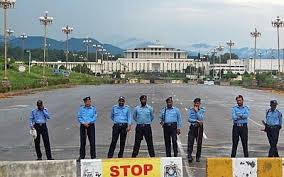
khybernews.tv
ISLAMABAD, Aug 19 — Thousands of Pakistani opposition supporters, some armed with sticks and wire cutters, marched into a fortified zone in the center of Islamabad on Tuesday night to press their demands for the resignation of the prime minister.
The protesters, who have camped in the capital since Friday, are led by Imran Khan, the former cricketer, and a charismatic cleric named Muhammad Tahir-ul Qadri, who run separate campaigns but are united in their opposition to Prime Minister Nawaz Sharif.
The march on the city’s red zone — an area that contains the Parliament, the prime minister’s official residence and many Western embassies — was widely seen as a final effort by Mr. Khan to rally his supporters after days of threats and political rhetoric.
Although Mr. Khan’s crusade attracted a crowd in Islamabad that was smaller, it received a major lift on Tuesday when his supporters merged with Mr. Qadri’s, forming a crowd that police estimated at more than 40,000 people marching into the red zone.
As participants started toward the Parliament building, television pictures showed a crane on the street that was apparently used to remove shipping containers impeding their way.
Mr. Sharif’s government, which came to power in June 2013, has struggled to quell the escalating political crisis, partly as a result of Mr. Sharif’s tense relationship with the Pakistani army leadership.
In recent days. Mr. Sharif’s administration failed to engage Mr. Khan and Mr. Qadri in negotiations to end the standoff and appeared to be hoping that the protests would simply fade.
But there was little sign of that on Tuesday evening, as Mr. Khan and Mr. Qadri both gave impassioned speeches before sending their followers toward the city’s protected area, which was ringed by shipping containers and thousands of police and paramilitary officers.
In his speech before a cheering crowd, Mr. Khan repeatedly attacked Mr. Sharif, whom he accuses of stealing the 2013 election through vote rigging. He has even challenged him to a duel.
Mr. Khan described the prime minister as a thief and a corrupt politician and vowed to turn the space outside the Parliament building into “a Tahrir Square,” a reference to the site of the 2011 uprising in Egypt. While instructing his jubilant supporters to remain peaceful, he repeatedly warned of the possibility of violence.
“Nawaz Sharif,” he told the crowd, directly addressing the prime minister. “If there is any violence, I will not leave you.” Moments later, when a helicopter hovered nearby, Mr. Khan said it had come to “take away Sharif,” drawing a roar of approval.
The government said that 30,000 security forces had been deployed to protect the red zone, which includes the United States Embassy. Witnesses said they could not see evidence of such a large contingent, but the army said in a statement that it had deployed 700 soldiers to protect the Parliament, the Supreme Court and other important buildings inside the zone.
The decision to deploy army troops was taken after a meeting between Mr. Sharif and the army chief, Gen. Raheel Sharif, who is not related to the prime minister.
“The army is not behind anyone,” said Chaudhry Nisar Ali Khan, the Pakistani interior minister, during a new conference earlier Tuesday.
Mr. Sharif’s officials have privately said they feared the opposition marches could provide a pretext for the military to intervene — much as it did in 1999 when Mr. Sharif’s last stint in power came to an abrupt end with a military coup.
Many suspect that Mr. Qadri, the cleric, has at least tacit backing from the military. Mr. Qadri denies any such links and is openly supported by the leaders of Barelvi and Shiite Islamic organizations, which has helped to galvanize his dedicated supporters.
Although numbers were hard to accurately estimate, many Pakistanis watching television Tuesday said that Mr. Qadri appeared to have amassed a larger crowd than Mr. Khan. While Mr. Khan’s street rallies often had the air of a music festival, Mr. Qadri’s rally, a few streets away, had a more purposeful air.
Whatever the outcome of the protests, analysts said they appeared to have opened a turbulent political period.
In a reminder of the pressing security challenges facing Pakistanis, the military said Tuesday that it had killed 48 people during airstrikes against Taliban camps in the North Waziristan and Khyber tribal districts.
Salman Masood reported from Islamabad and Declan Walsh from London.
